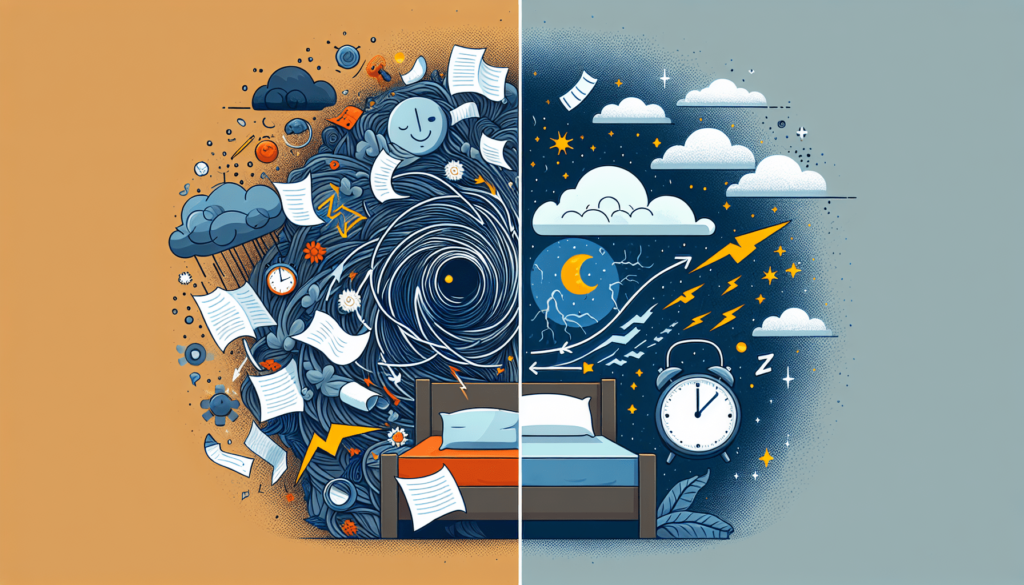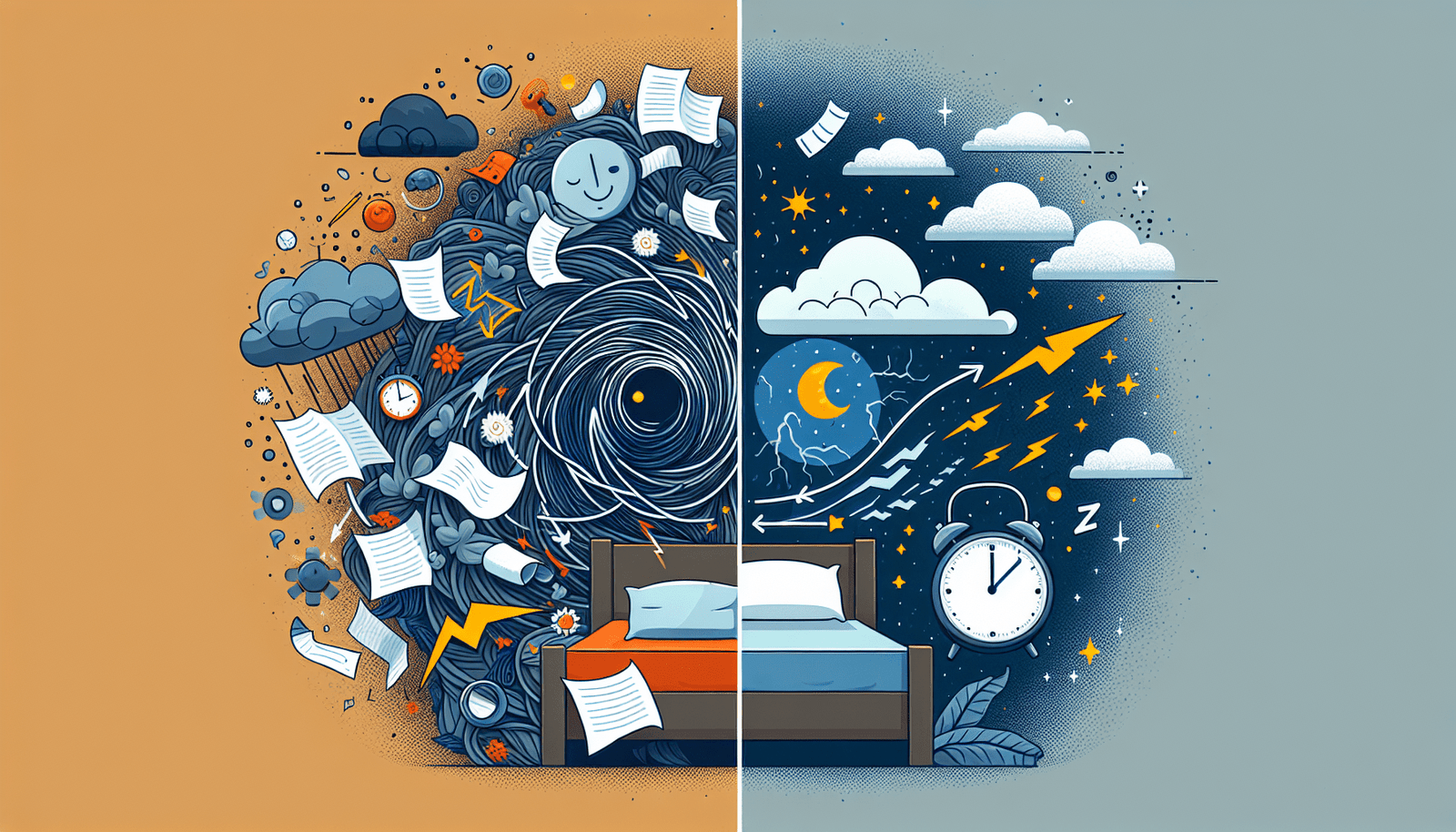Feeling stressed and anxious can wreak havoc on your sleep patterns, leaving you tossing and turning all night. But have you ever wondered how exactly stress and anxiety impact your ability to get a good night’s rest? In this article, we’ll take a closer look at the fascinating connection between these two experiences and the quality of your sleep. From racing thoughts that keep you awake to physical tension that prevents relaxation, we’ll explore the ways in which stress and anxiety can disrupt your precious slumber. So, if you’ve been struggling to catch those Zs lately, keep reading to uncover the secrets behind this intricate relationship.

Physical Effects
Increased heart rate and blood pressure
When you experience stress and anxiety, your body goes into a state of high alert. This triggers the release of stress hormones like adrenaline, which can cause your heart rate and blood pressure to increase. This physiological response is known as the “fight or flight” response and is designed to prepare your body to confront or escape from a perceived threat. However, when these stress responses occur frequently or persistently, they can have a negative impact on your sleep.
Muscle tension and pain
Stress and anxiety can also lead to muscle tension and pain. When you’re stressed, your body tends to hold onto tension, which can manifest as tightness in your muscles. This muscle tension can make it difficult to relax and fall asleep. It can also contribute to feelings of discomfort and pain, further disrupting your sleep quality.
Gastrointestinal issues
Another physical effect of stress and anxiety is the disruption of your digestive system. When you’re stressed, your body diverts energy away from non-essential functions, such as digestion, towards more immediate needs. This can lead to symptoms like stomachaches, indigestion, and even diarrhea or constipation. These gastrointestinal issues can cause discomfort that makes it challenging to fall asleep and stay asleep throughout the night.
Mental Effects
Racing thoughts
One of the common mental effects of stress and anxiety is having racing thoughts. When your mind is preoccupied with worries and concerns, it becomes challenging to calm your thoughts and transition into a relaxed state conducive to sleep. Racing thoughts can keep you awake, making it difficult to fall asleep even when your body is tired.
Difficulty concentrating
Stress and anxiety can also negatively impact your ability to concentrate during the day. When your mind is consumed by stress, it can be challenging to focus on tasks at hand. This difficulty in concentration can spill over into your nighttime routine, making it harder to wind down and prepare your mind for sleep.
Persistent worries and concerns
Stress and anxiety often bring about persistent worries and concerns that can overshadow your daily life and creep into your sleep routine. Whether it’s worrying about work, relationships, or future uncertainties, these persistent worries can make it challenging to relax and let go of stress, leading to poor sleep quality.
Sleep Onset Insomnia
Trouble falling asleep
Sleep onset insomnia refers to difficulties in falling asleep when you first go to bed. If you find yourself lying awake for long periods, unable to drift off, it could be a result of stress and anxiety. Your racing thoughts and heightened arousal levels can make it tough to transition from wakefulness to sleep, delaying the onset of sleep.
Restlessness and tossing in bed
When stress and anxiety are present, it’s common to experience restlessness in bed. You may find yourself tossing and turning, unable to find a comfortable position to relax into sleep. This physical restlessness can further exacerbate the difficulties in falling asleep, prolonging the time it takes for you to finally drift off.
Feeling wired or unable to relax
Anxiety and stress can often leave you feeling wired and unable to relax, even when you’re physically tired. This state of heightened alertness can make it difficult to unwind and embrace the relaxation needed for quality sleep. You may find yourself lying in bed, feeling restless and unable to quiet your mind and body.

Sleep Maintenance Insomnia
Frequent awakenings during the night
Sleep maintenance insomnia involves difficulties in staying asleep throughout the night. If you frequently wake up during the night and struggle to fall back asleep, stress and anxiety may be contributing factors. As your body remains in a heightened state of alertness, even minor disturbances can disrupt your sleep, leading to frequent awakenings.
Difficulty falling back asleep after waking
When you do wake up during the night, falling back asleep can become a challenge. Racing thoughts and worries may flood your mind as soon as you awaken, making it difficult to quiet your thoughts and return to sleep. This difficulty in falling back asleep further fragments your sleep and reduces its overall quality.
Sleep disturbances and nightmares
Stress and anxiety can also lead to sleep disturbances like nightmares. These vivid and often frightening dreams can jolt you awake, leaving you feeling anxious and scared. Sleep disturbances and nightmares not only impact the length of your sleep but also contribute to a sense of unease and restlessness during the night.
Shortened Sleep Duration
Difficulty getting enough sleep
Stress and anxiety can lead to difficulties in obtaining the recommended amount of sleep each night. Whether it’s due to difficulties falling asleep or staying asleep, the overall result is that you struggle to get enough sleep. This sleep deprivation can have a significant impact on your physical and mental well-being.
Waking up too early
Another common manifestation of stress and anxiety is waking up earlier than desired. You may find yourself waking up before your alarm, feeling wide awake and unable to fall back asleep. This early awakening further contributes to a shortened sleep duration and can leave you feeling tired and groggy throughout the day.
Clock watching throughout the night
Stress and anxiety often result in a heightened sense of time awareness. When you’re stressed, you may find yourself constantly checking the clock, worrying about how much sleep you’re losing and how early you have to wake up. The constant checking of time can keep you mentally stimulated and prevent you from fully relaxing, making it difficult to fall asleep and stay asleep.
Poor Sleep Quality
Light, fragmented sleep
Stress and anxiety can lead to light and fragmented sleep. Your sleep may be characterized by frequent awakenings, shallow sleep, and a lack of restorative deep sleep. As a result, even if you spend an adequate amount of time in bed, you wake up feeling tired and unrefreshed.
Vivid dreams and nightmares
Stress and anxiety can also contribute to the presence of vivid dreams and nightmares during sleep. These intense dreams can be disturbing and emotionally draining, causing sleep disruptions and impacting the overall quality of your sleep. You may wake up feeling unsettled and anxious due to the content of these dreams.
Feeling unrefreshed upon waking
Even if you manage to sleep for an adequate duration, stress and anxiety can leave you feeling unrefreshed upon waking. The constant alertness and heightened arousal levels can prevent you from entering into the deeper stages of sleep, which are essential for restorative rest. As a result, you wake up feeling groggy and lacking energy.
Impact on REM Sleep
Disrupted REM sleep
REM (rapid eye movement) sleep is a stage of sleep characterized by vivid dreaming and rapid eye movements. Stress and anxiety can disrupt the normal pattern of REM sleep, leading to less time spent in this vital stage of sleep. Disruptions in REM sleep can contribute to sleep disturbances, decreased sleep quality, and affect your overall emotional well-being.
Decreased REM sleep duration
In addition to disruptions, stress and anxiety can also lead to a decrease in the overall duration of REM sleep. This reduction in REM sleep duration can impact your mental and emotional health, as REM sleep is crucial for emotional processing and regulation. Without sufficient REM sleep, you may experience heightened emotions and difficulties in managing stress.
Increased REM density
While stress and anxiety can decrease the duration of REM sleep, they can also result in increased REM density. REM density refers to the frequency and intensity of rapid eye movements during REM sleep. Higher REM density is associated with more intense and vivid dreams, which can contribute to sleep disturbances, leaving you feeling restless and mentally stimulated upon waking.
Sleep-Related Disorders
Insomnia disorder
Insomnia disorder is a sleep disorder characterized by difficulties falling asleep, staying asleep, or consistently waking up too early. Stress and anxiety are common triggers and contributors to insomnia disorder. If you find yourself experiencing chronic sleep difficulties due to stress and anxiety, it may be worth seeking professional help to address and manage these underlying factors.
Nightmares disorder
Nightmares disorder involves recurrent and distressing nightmares that significantly disrupt your sleep and cause distress upon waking. While nightmares can have various causes, stress and anxiety are common triggers. If you frequently experience nightmares that impact your sleep quality and overall well-being, it may be beneficial to consult with a sleep specialist or therapist who specializes in dream analysis and nightmare treatment.
Sleep apnea
While stress and anxiety are not direct causes of sleep apnea, they can exacerbate symptoms and make it more challenging to manage this sleep-related disorder. Sleep apnea is characterized by pauses in breathing during sleep, leading to disrupted sleep and daytime fatigue. Stress and anxiety can contribute to muscle tension and heightened arousal levels, which can worsen sleep apnea symptoms and make it harder to achieve restful sleep.
Vicious Cycle of Stress, Anxiety, and Sleep
Stress and anxiety leading to poor sleep
Stress and anxiety can create a vicious cycle with poor sleep. When you’re stressed or anxious, it becomes challenging to relax and calm your mind, making it difficult to fall asleep and stay asleep throughout the night. The lack of quality sleep then further enhances stress and anxiety levels, creating a cycle in which the two feed off each other.
Poor sleep exacerbating stress and anxiety
On the other hand, poor sleep can exacerbate stress and anxiety levels. When you’re sleep-deprived, your emotional regulation becomes compromised, making it more difficult to manage stressors effectively. Additionally, sleep deprivation increases the activation of the amygdala, the part of the brain associated with emotional responses, leading to heightened anxiety levels.
Cycle perpetuating itself
The cycle of stress, anxiety, and poor sleep perpetuates itself unless consciously addressed. Stress and anxiety disrupt sleep, which, in turn, increases stress and anxiety levels, leading to further sleep disturbances. Breaking this cycle requires proactive strategies to manage stress, promote relaxation, and improve sleep quality.
Tips for Managing Stress and Anxiety to Improve Sleep
Relaxation techniques (deep breathing, meditation)
Incorporating relaxation techniques into your daily routine can help alleviate stress and anxiety and improve sleep quality. Deep breathing exercises and meditation can help activate the body’s natural relaxation response, counteracting the physiological stress response and promoting a sense of calm and relaxation before bedtime.
Establishing a bedtime routine
Establishing a consistent bedtime routine signals to your body and mind that it’s time to wind down and prepare for sleep. Engage in relaxing activities such as reading a book, taking a warm bath, or practicing gentle stretching to create a peaceful transition from wakefulness to sleep. Consistency in your bedtime routine helps regulate your body’s natural sleep-wake cycle, making it easier to fall asleep and stay asleep.
Creating a sleep-friendly environment
Creating a sleep-friendly environment can significantly impact your ability to relax and fall asleep. Ensure that your bedroom is cool, dark, and quiet, considering the use of earplugs or white noise machines to mask external distractions. Invest in a comfortable mattress and pillow that provide adequate support for your body. Limit exposure to electronic devices and blue light before bedtime, as they can interfere with your body’s natural sleep-wake cycle.
By incorporating these tips into your daily life and actively managing stress and anxiety, you can pave the way for improved sleep and overall well-being. Remember, managing stress and prioritizing sleep are essential components of maintaining good physical and mental health.
